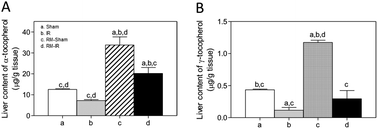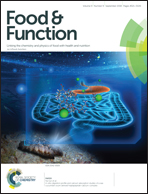Anti-oxidative and anti-inflammatory effects of Rosa Mosqueta oil supplementation in rat liver ischemia-reperfusion†
Abstract
Ischemia-reperfusion (IR) is a deleterious condition associated with liver transplantation or resection that involves pro-oxidant and pro-inflammatory mechanisms. Considering that Rosa Mosqueta (RM) oil composition is rich in protective components such as α-linolenic acid (ALA) and tocopherols, we studied the effects of RM oil supplementation given prior to an IR protocol. Male Sprague-Dawley rats receiving RM oil (0.4 mL d−1) for 21 days were subjected to 1 h of ischemia followed by 20 h reperfusion. Parameters of liver injury (serum transaminases, histology), oxidative stress [liver contents of protein carbonyls, thiobarbituric acid reactants, Nrf2 activity and its target mRNA expression of heme oxygenase-1 (HO-1) and NADPH-quinone oxidoreductase-1 (NQO-1)] and inflammation [nuclear factor-κB (NF-κB) and its target mRNA expression of tumor necrosis factor-α (TNF-α) and interleukine-1β (IL-1β)] were studied. RM oil increased liver ALA and its derived EPA and DHA fatty acids’ contents, with enhancement in those of α- and γ-tocopherols. IR induced inflammatory liver injury, with enhancement in serum transaminases, oxidative stress-related parameters with reduced Nrf2 signaling, and higher pro-inflammatory cytokines, indexes that were attenuated or abrogated by RM oil pretreatment. It is concluded that RM oil supplementation represents a novel non-invasive preconditioning strategy against liver injury induced by IR that has potential clinical applications in metabolic stress conditions.



 Please wait while we load your content...
Please wait while we load your content...